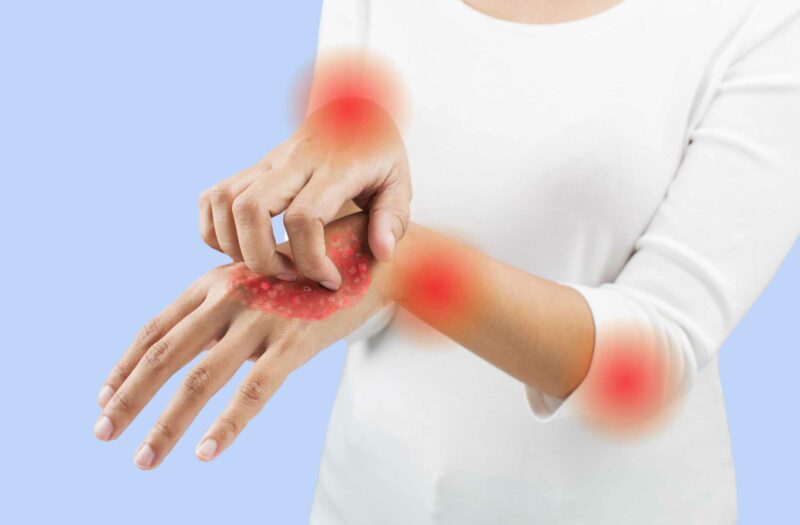Key Takeaways
- Itch, skin pain, and joint pain are all linked to lower quality of life but joint pain is linked to increased use of pain relievers.
- Pain relievers are not without risks, so it’s important to discuss pros and cons with your doctor.
- If you have psoriasis and you’re experiencing joint pain, explore the possibility of PsA with your health care team.
People who have psoriasis, an inflammatory skin condition, tend to use more pain relievers than the general population. Psoriasis skin plaques can be painful, but it turns out that skin pain isn’t what’s driving most of them to seek pain relief. Instead, joint pain seems to be the primary driver.
According to a new study, published in the Journal of the American Academy of Dermatology, psoriasis patients with psoriatic arthritis (PsA) — a condition that combines psoriasis plaques with joint inflammation — used more analgesics than those without PsA.
The condition of one’s skin didn’t appear to be a major factor. “There was no association between the extent of psoriasis and use of any of the examined analgesics,” the authors wrote.
While up to 30 percent of people with psoriasis will eventually develop PsA, the researchers found that a significant number of psoriasis patients who had not been diagnosed with PsA also complained of joint pain and were more apt to use pain relievers. This suggests that PsA might be undiagnosed or developing in these patients.
To reach these findings, the scientists analyzed data from the Danish Skin Cohort, which included information on more than 4,000 people with psoriasis, nearly 850 of whom had PsA. They compared them with nearly 3,500 “reference individuals,” who did not have psoriasis or PsA.
While heavy use of any kind of pain relievers may be problematic, the authors noted that 14 percent of those with psoriasis alone and 23 percent of PsA patients had used opioids within the past 12 months (as compared to 9 percent of the general population). Opioids can be addictive, in addition to causing side effects such as constipation, nausea, and slowed breathing.
Other kinds of common pain relievers, including non-steroidal anti-inflammatory drugs (NSAIDs) like ibuprofen and naproxen, are also potentially risky, especially when used excessively. They may lead to ulcers and gastrointestinal bleeding and even raise the risk of heart attack and stroke.
“Itch, skin pain, and joint pain were associated with lower quality of life [but] only joint pain was associated with increased use of analgesics,” the authors concluded. “Increased attention on such symptoms by physicians may be warranted to further improve management of patients with psoriasis in clinical practice.
The bottom line: If you have psoriasis and you’re experiencing joint pain, don’t ignore it. Talk to your dermatologist to see if you need a referral to a rheumatologist or further testing to determine if you could have PsA.
Found This Study Interesting? Get Involved
If you are diagnosed with arthritis or another musculoskeletal condition, we encourage you to participate in future studies by joining CreakyJoints’ patient research registry, ArthritisPower. ArthritisPower is the first-ever patient-led, patient-centered research registry for joint, bone, and inflammatory skin conditions. Learn more and sign up here.
Cleveland Clinic. Non-Steroidal Anti-Inflammatory Drugs (NSAIDs). https://my.clevelandclinic.org/health/drugs/11086-non-steroidal-anti-inflammatory-medicines-nsaids.
John Hopkins Medicine. What Are Opioids? https://www.hopkinsmedicine.org/opioids/what-are-opioids.html.
Loft N, et al. “Disease Burden, Symptoms, and Use of Analgesics in Patients with Psoriasis with or without Psoriatic Arthritis: A Cross-Sectional Study.” Journal of the American Academy of Dermatology. March 2022. doi: https://doi.org/10.1016/j.jaad.2021.07.028.
Ritchlin C, et al. “Psoriatic Arthritis.” New England Journal of Medicine. March 2017 doi: https://doi.org/10.1056/NEJMra1505557.






